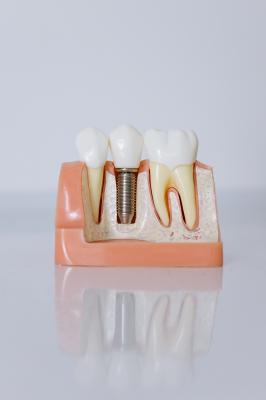Dental implants are a type of dental prosthesis that can be used to attach crowns, bridges, or dentures to your mouth, restoring your smile, your ability to chew, and your confidence.
However, there are different types of dental implants, so it's essential to know how they work and understand why you and your dentist might choose one type of dental implant over another.
The Three Main Dental Implant Types
1. Endosteal
Endosteal dental implants are the most common type of dental implant used. They have a very high success rate when used to replace one or several teeth.
Endosteal implants are typically made of titanium and shaped like small screw-like posts, surgically implanted directly into the jawbone.
The titanium posts then naturally fuse to the jawbone, with the tips protruding through your gums. This process generally takes around six months from start to finish. Your dentist will attach temporary healing caps to the posts for the duration of the healing period.
After they are healed, endosteal dental implants provide a secure support structure that your dentist can use to attach a permanent single-tooth crown, a dental bridge of multiple teeth, or a permanent denture piece.
These crowns, bridges, or dentures are custom-made to fit your mouth perfectly and colored to match the surrounding teeth as closely as possible, providing you with a seamless smile again!
The number of implants required will differ depending on how many replacement teeth you need. For example, three-tooth bridges require two implants, one for each tooth on either end of the bridge. On the other hand, an individual crown only requires one implant.
For endosteal dental implants to work, you need to have healthy jawbone tissue and strong bone mass. In some cases, the dentist might use a bone grafting procedure to add some bone mass for the implants to fuse to.
2. Subperiosteal
The second most common type of dental implant is subperiosteal implants. The main difference between endosteal and subperiosteal implants is that subperiosteal implants don't actually go into your jawbone.
Instead, subperiosteal dental implants rest on top of the bone, just under the gums, and are held in place by soft tissue.
This provides a new foundation to fix your new artificial teeth to and offers more stability than traditional dentures.
Subperiosteal implants are typically only used if there is not enough healthy jawbone to support endosteal implants, and bone grafting can't be used to add sufficient bone mass. They're an intermediary option between dentures and endosteal dental implants.
One advantage of subperiosteal implants over endosteal implants is that they usually only require two appointments to install and have a shorter recovery time than other dental implants.
3. Zygomatic
Zygomatic dental implants are far less common than the two dental implants discussed above, as they have particular use cases.
Zygomatic implants replace teeth in the upper jaw and are placed into the cheekbone instead of the jawbone.
Like subperiosteal implants, zygomatic implants can work for patients with insufficient bone mass to support traditional dental implants. They can also be used in tandem with other dental implants to replace multiple teeth in both the upper and lower jaws.
Zygomatic implants don't require bone grafts or sinus lifts, contributing to a shorter and more comfortable treatment.
How To Choose the Right Dental Implants
The most important determinant in which type of dental implant is best for you is whether your jawbone can adequately support the implants.
Traditional endosteal dental implants can most likely replace your missing teeth if you have a healthy jawbone and haven't lost significant amounts of bone mass due to decay.
However, if you've lost a lot of bone mass due to periodontal disease or another condition, you may need to use subperiosteal or zygomatic implants to safely and securely replace your teeth.
A professional implant dentist can inspect your mouth and tell you what solution is right for you.
Why Choose Dental Implants To Replace Your Missing Teeth?
There are many reasons to choose dental implants to replace missing teeth. For starters, they can restore the full functionality of your teeth, allowing you to bite and chew more comfortably and efficiently.
Unlike traditional dentures, dental implants offer a permanent fix for missing teeth. Once they're installed, and you're fully healed, the replacement teeth look and feel just like your original teeth.
If one of your dental crowns, bridges, or dentures breaks, it's simply a matter of building new ones and replacing them by attaching them to the existing dental implants. There's no need to get new implants.
Of course, there's also the cosmetic side of things — shiny new teeth allow you to smile confidently and feel like your old self again!
There are also dental health reasons why you should consider getting dental implants. If you don't replace missing teeth, your jawbone can diminish and wear away over time.
Your remaining teeth can also shift and try to fill in the gap(s), leaving you with more cosmetic issues to fix.
Not only is this frustrating, but dental work can become significantly more expensive over time if you don't address your missing teeth now.
Summary of why to choose dental implants:
- Allows for more functional chewing/biting
- Permanent solution
- Builds confidence in your smile
- Jawbone can begin to diminish and wear away if the teeth are not replaced
- Keeps the rest of your teeth from shifting and trying to fill the gap
- More expensive to fix dental problems the longer you leave them
How Kneib Dentistry Can Help You
Dr. Robert W. Kneib is one of the few general dentists in the Erie area that places dental implants. He'll get you smiling and feeling normal again!
Remember that, to qualify for traditional endosteal dental implant surgery, you must have healthy oral tissue and strong jawbone ridges.
Schedule a consultation with Dr. Kneib today to determine whether you qualify and discuss the best options for replacing your missing teeth.


